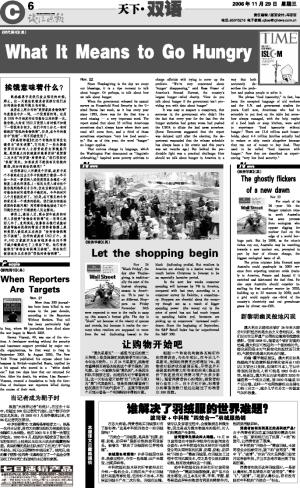Nov. 22
Since Thanksgiving is the day we count our blessings, it is a ripe moment to talk about hunger. Or perhaps, to talk about how we talk about hunger.
When the government released its annual survey on Household Food Security in the United States last week, as it has every year since 1995, there was for the first time a word missing — a very important word. The report stated that about 35 million Americans sometimes don't always know where their next meal will come from, and a third of those sometimes experience "very low food security." But as of this year, the word "hunger" no longer applies.
That curious change in language, which the Washington Post denounced as "linguistic airbrushing," inspired some poverty activists to charge officials with trying to cover up the problem. "We're very concerned about 'hunger' disappearing," said Ross Fraser of America's Second Harvest, the country's largest hunger-relief charity. "How do you talk about hunger if the government isn't providing you with data about hunger"
It was easy to suspect a conspiracy, that someone in the government who didn't like the fact that every year for the last five the hunger statistics had gotten worse had pushed the USDA to dilute the bad news somehow. (Some Democrats suggested that the report was delayed until after the election; the department responded that the release schedule has always been a bit erratic and this year's was set months ago.) But behind the predictable fight was a practical challenge: How should we talk about hunger in America in a way that both accurately describes the problem and pushes people to solve it.
The phrase "food insecurity," in fact, has been the accepted language of aid workers and the U.N. and government studies for years. Until now, Americans who had to scramble to put food on the table but somehow always managed, with the help maybe of a food bank or soup kitchen, were said to experience "food insecurity without hunger." There are 12.6 million such households; about 4.4 million families actually had to reduce or skip meals altogether because they ran out of money to buy food. They used to be called "food insecure with hunger." Now they are described as experiencing "very low food security."

